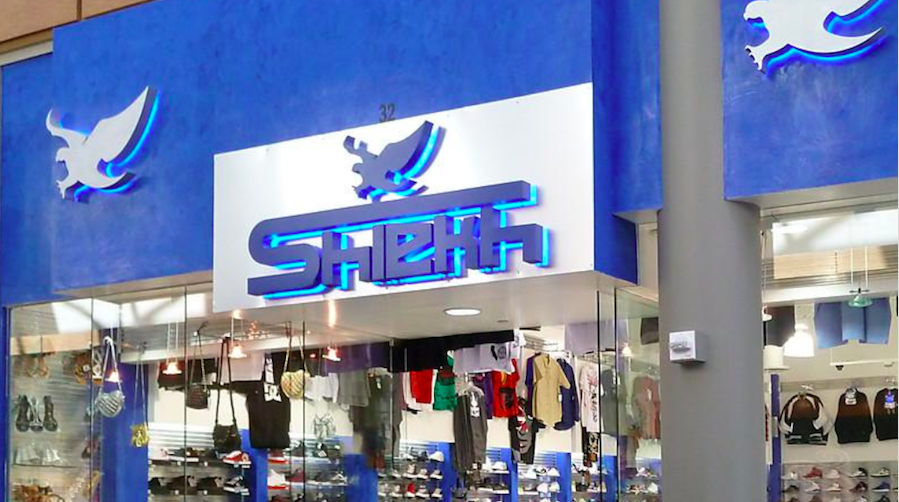Shiekh Shoes, in bankruptcy proceedings since November 29, is seeking court approval for a new $5 million term loan on more generous terms from the owner’s brother to replace its debtor-in-possession facility. However, Comvest, a junior secured lender, has objected to the new financing and is pushing for a liquidation.
In requesting for the new DIP arrangement, Shiekh Ellahi, founder and CEO, wrote in court documents that the urban retailer was seeking a senior secured post-petition term loan in the principal amount of $5 million to pay off Shiekh Shoes’ existing pre-petition and post-petition senior secured debt of State Bank And Trust. Any excess funds would be used to fund operations and administrative expenses.
The term loan – supplied by his brother, Anjum Shiekh – is intended to be a first stage of funding, followed by a second stage of funding that will come in the form of either a $10 million loan from the refinance, sale, or other transaction involving residential property owned by Shiekh Ellahi and his brother, Anjum Shiekh; or a secured credit facility from a third party financing source in an amount necessary to fund operations and administrative expenses.
The two brothers share a Malibu residence that Shiekh Ellahi estimates has a current estimated fair market value of approximately $30 million, with a first priority mortgage securing obligations of $3.7 million.
Shiekh Shoes is seeking the new DIP facility because it has been in default of State Bank’s facility since December 21. Among the reasons for the default was that the retailer uses banking services from Bank of America and it was unable to complete many required changes as part of the State Bank DIP agreement – including transferring all bank accounts in Shiekh Ellahi’s name to the retailer’s name – because of delays caused by Bank of America policies.
The default caused all obligations to bear interest at the default rate effective as of December 21. State Bank also reserved the right to exercise all of its rights and remedies under such a default scenario, including suspending all lending, declaring all obligations immediately due and payable, and forcing a liquidation.
Ellahi said that while State Bank showed a willingness to potentially support a waiver and amendment agreement to cure the default, an amended State Bank facility would ”severely” restrict funding availability; require a $120,000 waiver and amendment fee , still require the company to satisfy a number of real estate milestones within relatively short extended deadlines; and have all obligations continue to accrue interest at the high default rate.
The CEO wrote that the State Bank facility “would only serve to delay (rather than avoid) a further round of defaults and increase the risk of State Bank taking further, more aggressive action in exercising its rights and remedies to the detriment of the Estate.”
The term loan from his brother came after numerous attempts to locate alternative financing all came in at higher interest rates. His brother has also consulted with separate counsel in connection with the proposed term loan.
Ellahi said he believes the retailer will be able to fund operations and administrative expenses with the first stage term loan and cash collateral until the retailer procures and finalizes the second stage of funding. He noted that the retailer had just completed a “busy holiday season” and its cash position will also benefit from the closing of stores and lease modifications. The company is holding going-out-of-business sales at 31 locations and those sales are expected to be completed by the close of January. When it filed for bankruptcy, it had 125 doors.
Concluded Ellahi, “In short, I believe that none of the other potential financing alternatives is as favorable to the debtor as the term loan and none is able to close as quickly as the term loan to immediately stop the accrual of default interest and related risks of maintaining the State Bank DIP facility.”
In objecting to the term loan, Comvest, which acquired its secured debt through Shiekh Shoes’ purchase in early 2016 of Karmaloop, wrote that entering into DIP financing “with an insider is misguided and should not be approved on shortened time.”
Comvest’s lawyers wrote in court papers, “Given the circumstances of this case to date, it is untenable to force creditors to evaluate a significant new loan agreement with little notice; particularly in the circumstance where the debtor could have engaged significant creditors, like Comvest, in a discussion regarding this proposed financing, but elected to surprise them with pleadings set on shortened notice.”
Comvest also pointed out that Shiekh Shoes failed to meet its budget for the first month of the case “by a very significant margin,” is already in default under its existing DIP financing, and has failed to find any third party lender willing to provide DIP financing on arms’-length terms.
Wrote Comvest, “The estate grows more insolvent with each passing week. Hence, the various creditors (both secured and unsecured) in this case would be better protected if the court were to refuse to grant the DIP financing motion because an organized liquidation of the debtor’s assets will maximize the value of the debtor’s estate and result in the best possible recovery for creditors.”
In response, Shiekh Shoes’ lawyers wrote that on February 27, 2018, the company’s gross inventory balance (at cost) is projected to be approximately $24.5 million against total net debt senior to Comvest (once the second phase of funding of $10 million is in place) of only approximately $2.1 million. This leaves Comvest with an equity cushion of approximately $22.4 million. The cushion also doesn’t include the going concern value or the debtor’s other assets.
Shiekh Shoes argues that the company still has “significant going-concern value and that there are substantial benefits to be derived from the restructured leases the debtor is in process of implementing, a more focused business strategy, and reduced operating costs that will be achieved through the debtor’s restructuring.”
Comvest “has additional adequate protection” in the form of this going concern value, but does not mention the beneficial impact to all the creditors from pursuing a comprehensive plan of reorganization and restructuring of the debtor, the preservation of substantially more than 1,000 jobs, and the benefits to other creditors from an on-going business relationship with the debtor.”
As part of its reply, Gerry Seli, managing director of KGI Advisors, financial advisors in the case for Shiekh Shoes, also said Comvest’s liquidation analysis underestimates projected cash on hand and debt levels.
Seli added that the term loan “provides significant cost savings to the estate with less fees, less expenses, less constricted availability and less risk of forced liquidation and/or loan maturity.”
He also noted that Shiekh Shoes’ shortfall in projected operating sales (excluding liquidation sales) was largely a result of Nike product launches that were missed because of the inability to purchase inventory form Nike due to capital constant. The retailer had been told they would be able to receive launch product from November 11 and November 24 in December but the “the inventory was no longer available and apparently sold out” at other stores. Excluding the estimated $1.25 million Shiekh Shoes lost due to the missed launches, the miss from plan would have been “minimal,” wrote Seli.
Nike represents 60 percent of Shiekh Shoes’ mix.
Photo courtesy Shiekh Shoes
















